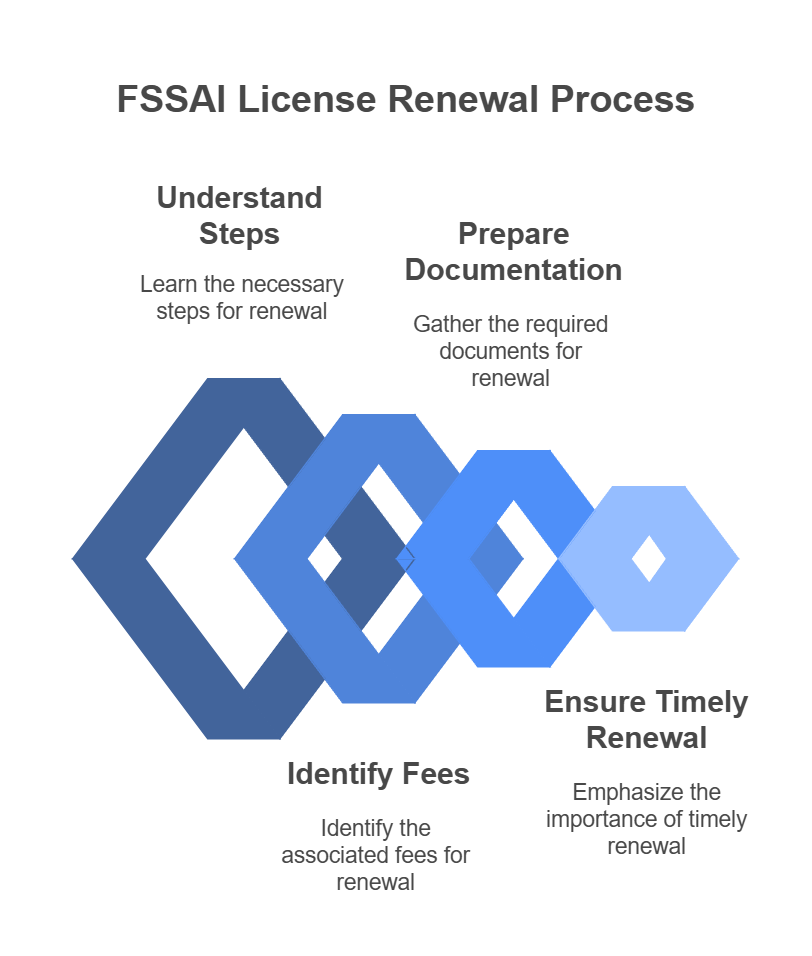Introduction

FSSAI License Renewal
The Food Safety and Standards Authority of India (FSSAI) is a government organization tasked with overseeing and regulating food safety throughout India. Its role is to ensure that food products adhere to established quality standards, thereby safeguarding consumer health and fostering fair practices in the food trade.
An FSSAI License is an essential permit required for food businesses in India, confirming their adherence to food safety regulations. Whether you operate a small food stall or a large manufacturing facility, securing and renewing an FSSAI license is vital for legal operation.
FSSAI provides three types of licenses based on the size and revenue of the business:
- Basic FSSAI Registration – Designed for small businesses with a turnover of up to ₹12 lakh.
- State FSSAI License – Intended for medium-sized businesses with a turnover ranging from ₹12 lakh to ₹20 crore.
- Central FSSAI License – Meant for large businesses with a turnover exceeding ₹20 crore or those engaged in import/export activities.
Renewing your FSSAI license is crucial because these licenses are valid for a period of 1 to 5 years, depending on the chosen duration during registration. Timely renewal is essential to maintain smooth business operations and avoid any legal repercussions.
🔹 Why is Renewal Necessary?
- Legal Compliance under the Food Safety and Standards Act, 2006
- Avoid penalties or cancellation of the license
- Ensure continued food safety and quality assurance
What is FSSAI License Renewal & Why is it Important?
FSSAI License renewal is crucial for businesses to maintain compliance with food safety regulations and hygiene standards. Not renewing the license can result in penalties, suspension, or even cancellation. Additionally, the renewal process allows businesses to update their information and stay aligned with any new FSSAI guidelines.
Why is FSSAI Renewal Important?
- Legal Compliance: As per FSSAI regulations, every food business must have a valid license.
- Avoiding Penalties: Late renewal results in penalties and additional documentation requirements.
- Consumer Trust: A valid FSSAI license ensures your customers that your products meet safety standards.
Consequences of Not Renewing on Time:
- Penalty of INR 100 per day beyond the expiry date.
- Possible cancellation of the license, requiring fresh registration.
- Legal actions for non-compliance with food safety regulations.
How to Renew FSSAI License Online? (Step-by-Step Guide)
Renewing your FSSAI license is a simple process through the FOSCOS (Food Safety Compliance System) portal.
✅ Step 1: Visit the FOSCOS Portal
Go to the official FOSCOS website.
✅ Step 2: Log in with Your Credentials
Use your username and password to access your FSSAI account.
✅ Step 3: Select “Renew License” Option
Navigate to License/Registration Renewal under the dashboard.
✅ Step 4: Upload Required Documents
See the full list of required documents below.
✅ Step 5: Pay the Renewal Fee
Fees depend on license type and validity (1-5 years).
✅ Step 6: Submit the Application & Track Status
You can check the renewal status through the FOSCOS portal
FSSAI License Renewal Fees (1 Year, 5 Years, Late Fees & Penalties)
The renewal fees vary based on the type of license and how long it is valid for.
| License Type | 1 year | 5 year |
|---|---|---|
| Basic Registration | ₹100 | ₹500 |
| State License | ₹2,000 – ₹5,000 | ₹10,000 – ₹25,000 |
| Central License | ₹7,500 | ₹37,500 |
Late Renewal Penalties
- A late fee of ₹100 per day applies if the renewal application is submitted after expiry.
- If the license is not renewed within 90 days of expiry, a fresh application is required.
Documents Required for FSSAI License Renewal
Before applying for FSSAI license renewal, ensure you have the following documents ready:
- Form B – This is a duly filled and signed application form required for renewal.
- Previous FSSAI License Copy – You must provide proof of your existing registration.
- Address Proof – Documents such as a rental agreement, electricity bill, or property tax receipt can serve this purpose.
- Food Safety Management System (FSMS) Plan – It should clearly outline your food safety procedures and compliance measures.
- Additional Documents – Depending on your business type, FSSAI may also require extra paperwork, such as No Objection Certificate (NOC) from the municipality or water test reports.
Additional Documents (Depending on Business Type):
Manufacturing Units:
- List of manufactured food products.
- Water testing reports (if applicable).
- Details of processing equipment and production capacity.
Importers & Exporters:
- IEC (Import Export Code) certificate.
- Custom clearance documents.
Retailers & Distributors:
- Supplier list with FSSAI license details.
Restaurants & Hotels:
- Pest control reports.
- Fire safety certificate (if applicable).
Missing any of these documents could delay your renewal process. Therefore, double-check the FSSAI guidelines before submission. Additionally, ensure all documents are up to date and properly formatted to avoid rejection.
How to Check FSSAI License Renewal Status?
- Visit FOSCOS Portal.
- Log in with your FSSAI credentials.
- Click on ‘Track Application Status’.
- Enter your application reference number.
- Click ‘Search’ to check the current status.
What Happens If Your FSSAI License Expires?
- If your FSSAI license is not renewed before expiry, you may face the following consequences:
- Late Fees: ₹100 per day after expiry.
- Legal Consequences: Potential fines or business closure.
- Re-Application: If 90+ days pass after expiry, you must apply for a fresh license.
Common Mistakes to Avoid During FSSAI Renewal
Delaying the renewal process (start at least 30 days before expiry)
Uploading incorrect or incomplete documents
Ignoring FSMS requirements (a key factor in approval)
Recent Changes in FSSAI Regulations Affecting Renewals
- Online Application Simplification: FOSCOS portal upgrades have streamlined the process.
- Stricter FSMS Compliance: New guidelines require a more detailed FSMS plan.
- Penalty Enforcement: Heavier fines for businesses that fail to renew on time.
Why is the FSMS Plan So Important?
- Ensures food safety measures are implemented.
- Helps businesses stay compliant with ISO 22000 & HACCP.
- Required by FSSAI for license approval & renewal
FAQs on FSSAI License Renewal
1. Can we renew a FSSAI license online?
✅ Yes, via the FOSCOS portal.
2. What are the FSSAI renewal fees?
✅ Fees depend on license type & validity (₹100 to ₹7,500 per year).
3. What is the time limit for FSSAI license renewal?
✅ At least 30 days before expiry.
4. What is the validity of a FSSAI license?
✅ 1 to 5 years, based on the registration period selected.
5. Is GST mandatory for FSSAI registration?
✅ No, GST is not mandatory for FSSAI registration.
6. How can I download my renewed FSSAI certificate?
✅ Log in to FOSCOS → License/Registration Section → Download Certificate.
7. How many types of FSSAI licenses are there?
✅ 3 Types:
1️⃣ Basic License (Turnover up to ₹12 lakh)
2️⃣ State License (Turnover ₹12 lakh – ₹20 crore)
3️⃣ Central License (Turnover ₹20 crore+)
Conclusion
Renewing your FSSAI license on time is crucial for food business compliance. Start the renewal process at least 30 days before expiry to avoid penalties. Ensure all documents are updated and follow the FSMS requirements.
📢 Need help renewing your FSSAI license? Visit FOSCOS today!
About the Author
Vaibhav Deshmukh is a food safety expert with 5 years of experience in FSSAI compliance, food quality assurance, and regulatory audits.
✅ Internal Links:
✅ External Links:

Pingback: Quality Control vs. Quality Assurance: Key Difference